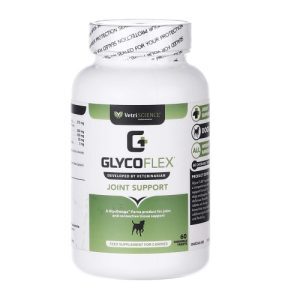Table of Contents
GlycoFlex is a pet dietary supplement designed to support joint health and mobility. These supplements are commonly used to help manage conditions like arthritis, hip dysplasia, and other joint-related issues in pets.

What Is GlycoFlex?
It is a pet dietary supplement designed to support joint health and mobility. These supplements are commonly used to help manage conditions like arthritis, hip dysplasia, and other joint-related issues in pets.
These supplements are formulated with a combination of ingredients that work synergistically to provide support to the joints. The main ingredient in the medicine is glucosamine, a natural compound found in the body that plays a vital role in the formation and repair of cartilage. Glucosamine helps maintain the structural integrity of the joints and promotes joint fluid production for lubrication.
In addition to glucosamine, these supplements may contain other ingredients that help enhance glucosamine’s effectiveness by promoting water retention and elasticity in the cartilage, supporting joint comfort, and helping reduce inflammation.
GlycoFlex supplements come in different formulations and strengths to suit pets’ specific needs at different stages of joint health. These products are typically available as chewable tablets (Glycoflex chews for dogs) or soft chews, making them easy to administer to pets.
Ingredients
What are the ingredients in Glycoflex?
Active Ingredients per Tablet:
· Glucosamine HCI (Shrimp and Crab) – 375 mg
· Pena Canalicus (Glycomega brand Green Lipped Mussel) – 300 mg
· Methylsulfonylmethane (MSM) – 250 mg
· N, N-Dimethylglycine HCI (DMG) – 50 mg
· Manganese (as Mn Proteinate) – 5 mg
Form of The Medicine
The supplement is available as chewable tablets or soft chews. These forms are designed to be palatable and easy for dogs to consume. The chewable tablets can be given directly to the dog or crushed and mixed with food, while the soft chews can be offered as a treat or broken into smaller pieces for smaller dogs or those who have difficulty chewing.
Uses of GlycoFlex
What does Glycoflex do for dogs?
It is typically used in the following situations:
- Joint Health Maintenance: It can be used daily to support overall joint health and mobility in dogs, especially in breeds prone to joint issues or as dogs age. It can help maintain healthy cartilage, support joint function, and promote flexibility.
- Arthritis and Joint Pain: Dogs diagnosed with arthritis or experiencing joint pain can benefit from this medicine. The supplement’s ingredients help reduce inflammation, support joint structure, and relieve discomfort.
- Post-Surgery or Injury: It may be recommended by veterinarians to aid in the recovery process after orthopedic surgery or an injury. It can assist in rebuilding damaged cartilage, promoting healing, and improving mobility during rehabilitation.
- Senior Dogs: Older dogs often experience age-related joint issues like osteoarthritis. This medicine can help manage these conditions by providing the necessary nutrients to support joint health, reduce stiffness, and enhance mobility.
Who Can Use the Tablets
Theses supplements are formulated for joint support and can be used by:
Dogs
It is primarily intended for dogs and puppies. It is available in various formulations and strengths to suit different sizes and needs of dogs, ranging from small to large breeds.
Cats
GlycoFlex also offers specific formulations for cats. These supplements support joint health in feline companions and help manage conditions like arthritis and mobility issues.
Horses
GlycoFlex for horses provides specialized products as well. These supplements are formulated to promote joint health, flexibility, and mobility in horses, which can be particularly important for performance horses or those with joint-related concerns.
It is crucial to choose products designed specifically for your kind of animal. Consult a veterinarian before administering joint supplements for dogs to ask which Glycoflex to use, ensure it is appropriate for your pet’s specific needs, and determine the correct dosage based on their size, condition, and health requirements.
Dosage Sizes
The dosage sizes can vary depending on the specific product and formulation. However, here are some general dosage guidelines for this product for small dogs and large dogs (Glycoflex for dogs dosage chart):
|
Weight Range |
Daily Dosage |
|
Up to 15 kg |
1/2 tablet |
|
15.5 kg – 30 kg |
1 tablet |
|
30.5 kg – 45 kg |
2 tablets |
|
45.5 kg and over |
2 1/2 tablets |
Please note that these dosages are provided as a general reference, and it’s essential to consult the specific product packaging or instructions for accurate dosage information for the particular supplement you are using. Additionally, it’s always recommended to consult a veterinarian to determine the appropriate dosage based on your dog’s specific size, health condition, and individual needs.

Important Safety Information for Owners
These supplements are generally considered safe for dogs. Still, you need to be aware of some important safety information:
- Before starting your dog on any new supplement regimen, it’s always recommended to consult a veterinarian. They can evaluate your dog’s health condition, provide proper guidance on dosage, and ensure it is suitable for your dog’s specific needs.
- While rare, some dogs may have allergies or sensitivities to certain ingredients in GlycoFlex or similar supplements. If you notice any signs of an allergic reaction, such as itching, rash, swelling, or difficulty breathing, discontinue use immediately and seek veterinary attention.
- If your dog is currently taking any other medications or supplements, it’s essential to inform your veterinarian. Some ingredients in this product could interact with certain medications, so it’s crucial to ensure compatibility and avoid potential adverse effects.
- Although uncommon, some dogs may experience gastrointestinal upset, such as diarrhea, vomiting, or decreased appetite, when starting a new supplement. If any of these symptoms persist or worsen, consult your veterinarian.
- These supplements are intended as a joint support aid but should not be considered a substitute for professional veterinary care. If your dog is experiencing severe joint issues, pain, or mobility difficulties, contact a veterinarian for a comprehensive evaluation and appropriate treatment plan.
Remember, every dog is unique, and their health needs may vary. Your veterinarian is the best resource for providing personalized advice and guidance regarding the safe and appropriate use of this medicine or any other supplements for your dog.
Veterinary Prescription
These supplements for dogs are typically available as over-the-counter products and do not require a veterinary prescription for purchase. These supplements are commonly found at the best price in pet supply stores, online retailers, and veterinary clinics. You may also choose discount or free shipping of Glycoflex.
However, it’s still advisable to consult a veterinarian before starting your dog on any new supplement.
Contraindications
GlycoFlex supplements are generally safe for dogs, but there are a few contraindications to be aware of. These include:
- Allergies or Sensitivities: Dogs with known allergies or sensitivities to any of the ingredients in this product should not be given the supplement. It’s important to review the ingredient list carefully.
- Bleeding Disorders: It contains ingredients like glucosamine and chondroitin, which can have mild blood-thinning properties. If your dog has a bleeding disorder or is on medications that affect blood clotting, it’s crucial to consult a veterinarian before using this product or any other supplement that may interfere with their condition or treatment.
- Pregnancy and Lactation: The safety of the supplements during pregnancy and lactation has not been extensively studied. It is generally recommended to avoid giving supplements or medications to pregnant or lactating dogs unless specifically advised by a veterinarian.
- Medication Interactions: Some medications, such as blood thinners or medications that affect the liver or kidneys, may interact with this product. Inform your veterinarian about your dog’s medications to ensure no potential interactions or adverse effects.
Side Effects
It is generally well-tolerated, but some dogs may experience mild Glycoflex for dogs side effects. These side effects are usually temporary and subside on their own. Here are a few potential side effects to be aware of:
- Gastrointestinal Upset: Some dogs may experience mild gastrointestinal symptoms, such as diarrhea, vomiting, or soft stools when starting the medication or any new supplement. These symptoms are typically mild and transient, but if they persist or worsen, it’s advisable to consult with a veterinarian.
- Allergic Reactions: While rare, dogs can potentially have an allergic reaction to certain ingredients in the supplement. Signs of an allergic reaction may include itching, skin rash, hives, swelling of the face or limbs, or difficulty breathing. If you observe any of these symptoms, discontinue use immediately and seek veterinary attention.
Side effects can vary from dog to dog, and not all dogs will experience them. Most dogs tolerate this product well without any issues.
If you notice any concerning or persistent side effects, consult a veterinarian.
Overdose
Giving an excessive amount of the drug or overdosing can potentially lead to health complications. If you suspect an overdose or have accidentally given your dog more than the recommended dose, it is crucial to immediately reach out to a veterinarian or an animal poison control hotline. They will provide guidance and specific instructions based on your dog’s size, the amount of GlycoFlex ingested, and any existing health conditions.
Keep a close eye on your dog for any signs or symptoms of adverse effects. These may include gastrointestinal issues like vomiting, diarrhea, or loss of appetite. Other potential signs could include lethargy, excessive thirst, increased urination, or changes in behavior.
Always use the supplement as directed and avoid giving your dog more than the recommended dosage.
GlycoFlex Poisoning
GlycoFlex poisoning in dogs is extremely rare, but in the unlikely event of a significant overdose or ingestion of many supplements, take the situation seriously and seek immediate veterinary assistance. Signs of poisoning can vary depending on the amount ingested and the individual dog’s sensitivity, but potential symptoms may include:
- Gastrointestinal Distress: Vomiting, diarrhea, abdominal pain, and loss of appetite may occur due to a significant overdose.
- Hemorrhage or Bleeding Disorders: In rare cases, excessive ingestion of the product could lead to bleeding disorders or prolonged bleeding time, as some ingredients in the supplement, such as glucosamine and chondroitin, can have mild blood-thinning properties.
If you suspect your dog may have ingested a large amount of medication or is showing any unusual symptoms, immediately contact a veterinarian or an animal poison control center for guidance. To prevent accidental ingestion, store the medicine securely.
Storage
Generally, storing this product in a cool, dry place away from direct sunlight, excessive heat, and humidity is recommended. Store it in a secure location inaccessible to your pets and children. This helps prevent accidental ingestion and ensures the safety of your furry companions. Properly seal the container or packaging after each use.
Generic and Brand Names of GlycoFlex
The generic name for GlycoFlex is “joint support supplements” or “joint health supplements.” These terms refer to the category of products that aim to support joint health in animals, including dogs.
Who makes Glycoflex for dogs?
It is a brand name for a specific line of joint support supplements developed by VetriScience Laboratories. Under the GlycoFlex brand, several specific formulations and strengths are available for dogs and cats, tailored to different sizes and needs.
Some of the specific brand names within the product line for dogs include:
- GlycoFlex I
- GlycoFlex II
- GlycoFlex III
- GlycoFlex Plus
- GlycoFlex Classic
- GlycoFlex Elite
It’s important to note that different formulations within the medicine brand may contain varying combinations and concentrations of active ingredients to address specific needs, such as different stages of joint support or varying severity of joint issues.
Other Drugs in the Same Class
While no drugs in the same class as this medicine are formulated explicitly as supplements, there are medications and drugs commonly used for joint health in dogs. Veterinarians may prescribe these medications for dogs with more severe joint issues. Some common drugs used for joint health in dogs include:
- Non-Steroidal Anti-Inflammatory Drugs (NSAIDs): NSAIDs such as carprofen (Rimadyl), meloxicam (Metacam), and deracoxib (Deramaxx) are commonly prescribed for dogs with arthritis or joint pain. These drugs help reduce inflammation and provide pain relief.
- Corticosteroids: Corticosteroids like prednisone or dexamethasone may be used to manage joint inflammation and pain in certain cases. They can provide short-term relief but are typically used cautiously due to potential side effects.
- Disease-Modifying Osteoarthritis Drugs (DMOADs): DMOADs such as Adequan and polysulfated glycosaminoglycans (PSGAGs) are injectable medications that can help protect and repair joint cartilage in dogs with osteoarthritis.
- Hyaluronic Acid Injections: Hyaluronic acid injections, such as Legend or Hyalovet, are sometimes used to provide lubrication and cushioning to joints, reducing pain and inflammation.
It’s important to note that veterinarians typically prescribe these medications based on a dog’s condition and health needs. They may require a prescription and should be used under the guidance and supervision of a veterinarian.
Comparing GlycoFlex to other Medicines:
Here is a comparison of this product to other joint health supplements commonly used for dogs:
Cosequin
Cosequin is another popular joint health supplement for dogs. It contains glucosamine and chondroitin sulfate, similar to this medicine. Both supplements aim to support joint function and mobility. The specific formulations and ingredient concentrations may vary between Cosequin products and GlycoFlex.
Dasuquin
Dasuquin is a joint supplement containing glucosamine and chondroitin sulfate. It additionally includes ASU (avocado/soybean unsaponifiables), which is believed to have additional anti-inflammatory effects. Dasuquin is available in different formulations for different sizes and stages of joint support.
Flexadin
Flexadin is a joint supplement that contains glucosamine and chondroitin, similar to GlycoFlex and Cosequin. It also includes omega-3 fatty acids, supporting joint health and anti-inflammatory effects.
Movoflex
Movoflex is a joint supplement that contains natural ingredients such as undenatured collagen Type II and hyaluronic acid. It aims to support joint health, cartilage function, and mobility. Movoflex may have a different formulation compared to this supplement, with specific ingredients targeting joint health.
Vetriflex
Vetriflex is a joint health supplement that contains ingredients such as glucosamine, chondroitin sulfate, and MSM (methylsulfonylmethane). It aims to support joint function and flexibility, similar to this product. The specific formulation and concentrations may vary between different Vetriflex products.
Phycox
Phycox is a joint supplement that contains ingredients like glucosamine, MSM, antioxidants, and omega-3 fatty acids. It aims to provide joint support, reduce inflammation, and promote healthy cartilage. Phycox is available in various formulations, including chewable tablets and soft chews.
Synovi g4
Synovi g4 is a joint health supplement that includes glucosamine, chondroitin sulfate, MSM, and antioxidants. It supports joint function, reduces inflammation, and promotes cartilage health. The specific formulation of Synovi g4 may vary compared to this drug and other supplements.
When comparing these joint health supplements, it’s essential to consider the specific formulation, concentration of active ingredients, recommended dosage, and individual dog’s needs.
FAQ
Does GlycoFlex work?
While the effectiveness of GlycoFlex may vary for each dog, many pet owners and veterinarians have reported positive results regarding improved mobility and comfort for dogs with joint issues. Joint supplements may work better for certain dogs or in specific situations, so consulting a veterinarian is recommended to determine the most suitable treatment for your dog’s joint health.
Where can I buy GlycoFlex for dogs, and who sells it?
GlycoFlex supplements for dogs are widely available and can be purchased from various sources. You can find it at the lowest price at veterinary clinics, pet supply stores, online retailers specializing in pet products, and e-commerce platforms. It’s always a good idea to check Glycoflex for dog reviews and purchase genuine products from reputable sources to ensure quality and authenticity.
Can you use Devcor with GlycoFlex?
Devcor is a brand of pet supplement that primarily focuses on cardiovascular health. While using multiple supplements together is generally safe, it’s essential to consult a veterinarian before combining different products, including Devcor and GlycoFlex.
Can a dog overdose on GlycoFlex?
It is generally safe for dogs when used as directed. However, giving an excessive amount of the product or overdosing can potentially lead to health complications. If you suspect an overdose or have accidentally given your dog more than the recommended dose, contact a veterinarian immediately for guidance.

































